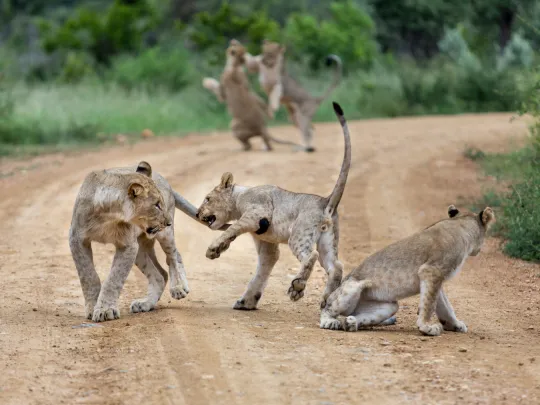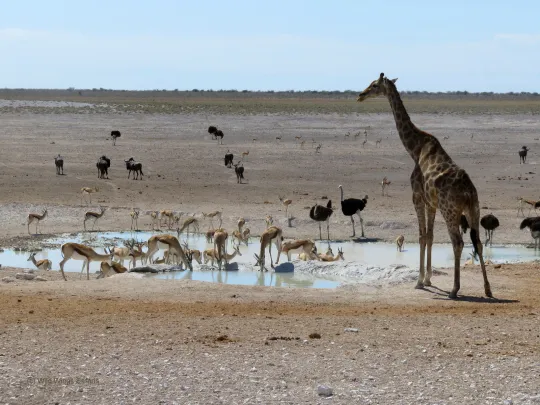The Best Way to Prevent Malaria on Safari: How to Avoid Mosquito Bites
Malaria is a serious but preventable disease transmitted by infected female Anopheles mosquitoes. While it is a concern in some African safari destinations, the risk for travellers is low, especially when proper precautions are taken. Malaria is both preventable and treatable, and cases among safari tourists are rare.
Understanding Malaria Risk on Safari
[Updated 7 February 2025]
If you're planning a safari in a malaria-risk area, the best way to protect yourself is to prevent mosquito bites. Taking simple precautions can significantly reduce your risk and allow you to focus on enjoying your safari adventure.
Why Do Mosquitoes Bite?

Mosquitoes are attracted to flowery scents
Mosquitoes are among the deadliest creatures on Earth, spreading diseases like malaria, dengue, and Zika. Here are some key facts about what attracts them:
- Only female mosquitoes bite because they need blood to reproduce.
- Mosquitoes are attracted to carbon dioxide from human breath and skin, detecting it from up to 23 metres away.
- Men, pregnant women, and people with a higher body temperature tend to get bitten more often.
- Sweat, body odour, and certain floral-scented toiletries attract mosquitoes.
- Dark-coloured clothing (especially black and navy blue) makes you more visible to mosquitoes.
- Genetics play a role—about 10% of people are particularly attractive to mosquitoes.
How to Prevent Mosquito Bites on Safari

If provided, sleep under mosquito nets
1. Wear Protective Clothing
- Cover up in light, neutral-coloured long-sleeved shirts and trousers, especially in the evenings.
- Avoid dark colours, which attract mosquitoes.
2. Use Effective Insect Repellent
- Apply a DEET-based repellent (20-50%) on exposed skin. It remains the most effective option.
- Reapply every few hours, especially after sweating.
- If using sunscreen, apply it first and then repellent.
3. Sleep Under Mosquito Nets
- Most safari lodges provide mosquito nets—use them to create a barrier while you sleep.
- Ensure that window screens and doors are closed to keep mosquitoes out of your room.
4. Use Fans and Air Conditioning
- Mosquitoes struggle to fly in strong air currents, so using a ceiling fan, standing fan, or air conditioning can help keep them away.
5. Avoid Floral Fragrances
- Perfumes, lotions, and soaps with floral or fruity scents attract mosquitoes.
- Opt for fragrance-free or mosquito-repelling products.
6. Stay Indoors During Peak Mosquito Hours
- Mosquitoes are most active at dusk and dawn—limit outdoor activity during these times if possible.
7. Use Mosquito Coils and Electric Repellents
- Many safari lodges provide mosquito coils or plug-in repellents—use them in your room for added protection.
8. Take Malaria Prophylaxis If Advised
- Consult a doctor or travel clinic before your trip to determine if malaria medication is recommended for your destination.
- Take the medication as directed, starting before your trip and continuing after you return.
What If You Get Bitten?
First, don't panic. While mosquitoes can carry malaria, less than one in 10,000 mosquitoes are actually infected. The risk of contracting malaria is significantly lower in remote safari lodges, where human populations are sparse. If you develop flu-like symptoms, fever, or chills within seven to 18 days of travel, seek medical attention immediately. Malaria is highly treatable if diagnosed early.
Malaria Risk by Season

The Namib-Naukluft National Park is a fantastic malaria-free safari area
High-Risk Period: Rainy Season (September to May)
- Mosquitoes thrive in warm, wet conditions.
- If you are at higher risk (e.g., pregnant, immunocompromised, or travelling with young children), consider visiting in the dry season.
Lower-Risk Period: Dry Season (June to August)
- Mosquito populations decline due to cooler temperatures and less standing water.
- This is an ideal time for safaris in malaria-risk areas.
Malaria-Free Safari Destinations
If you'd rather avoid malaria areas altogether, consider malaria-free safari destinations such as:
- Madikwe Game Reserve
- Pilanesberg National Park
- Waterberg Region (Marataba, Welgevonden, Lapalala, Qwabi, Mabula)
- Eastern Cape Reserves (Shamwari, Amakhala, Kwandwe, etc.)
- Most of Namibia, including popular safari destinations such as Etosha National Park and the Namib-Naukluft National Park.
Final Thoughts
Malaria should not deter you from experiencing the incredible wildlife and landscapes of Africa. By taking simple precautions, you can significantly reduce your risk and enjoy a safe and memorable safari. If you have concerns, speak to your safari specialist, who can recommend the best destinations based on your comfort level and health considerations.
For more malaria prevention tips and safari planning advice, contact us today!
You may also want to look at

Magical Madikwe - much more than just malaria-free
Madikwe Game Reserve in South Africa's North-West Province has several surprises in store. It's one of the best conservation areas in Africa. It's a Big 5 reserve. It's malaria-free. And it has a whole lot more to offer ...

Enticing Namibia - Nothing Can Compare
A visit to Namibia could change you forever. There's something about its largely-uninhabited wide open spaces, fascinating people and cultures, vast distances, desert-adapted wildlife and arid, stark landscapes that touches your very soul.

Keeping You Safe On Safari: Travel Health Tips
Planning an African safari? Wondering about vaccinations, health precautions, or malaria risks? Staying informed is key to enjoying a safe and stress-free adventure. In this guide, we break down essential travel health tips, from Yellow Fever requirements to malaria prevention, ensuring you're well-prepared for your journey. With expert advice and practical recommendations, you can focus on making unforgettable safari memories—worry-free!
About the author

A 'word smith' or copywriter with over 25 years experience, love travelling, wildlife and conservation; fascinated by alternative energy, alternative building and alternative health. Consummate reader and traveller, both internationally and southern Africa. Have two remarkable daughters that continue to amaze and teach me daily. Consider myself privileged to live on the best continent on the planet.









